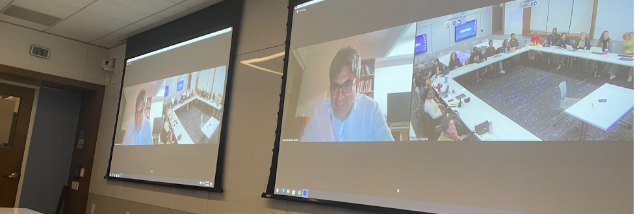On Wednesday, November 16, students of the course ITSF 5500 - Education Across the Americas taught by Professor Regina Cortina, engaged in conversation with Professor Martín Benavides. It was an insightful opportunity to discuss education policymaking in Peru and Benavides’ experience as a Minister during the COVID-19 pandemic.
Benavides is a Peruvian sociologist, who served as Peru’s Minister of Education from February 2020 to November 2020, right at the start of the pandemic. He is now a Professor at the Pontifical Catholic University of Peru. He holds a Ph.D. in sociology and a master’s degree in educational policy from Pennsylvania State University, and a bachelor's in sociology from the Pontifical Catholic University of Peru. Benavides also served between 2015 and 2018 as a member of the Board of Directors of Peru’s National Superintendence of Higher University Education (SUNEDU).
Benavides titled his presentation to the class “The Political Economy of Peruvian Education: Gaps, Interests, and Conflicts”, reflecting on the challenges he has experienced to advance reforms in education and promote transparency. We learned about inequality in Peru, efforts to mitigate gaps in accessing education during the pandemic, and how to design a curriculum when there are fundamental disagreements among stakeholders on what it should look like. Benavides also spoke to us about centralization and decentralization, corruption in education, and the negotiation process within educational policymaking prior to implementation.
Students had the opportunity to read his book “La Reforma (Im)posible” “The (Im)possible Reform” prior to his presentation. Listening to Benavides speak about the university reform in Peru that he advocated for allowed us to further understand the events narrated in the book, in addition to the analysis of confronting challenges in the Peruvian education sector between 2018 and 2020. In a way, the book is a memoir about education policymaking and implementation that gave us real-life examples of the difficulties in making systematic reforms when corruption prevails. “University resources were used for purposes other than educational”, Benavides added.

The class asked multiple questions to Benavides. The floor opened with a Peruvian student at Teachers College (TC) who wanted to learn more about how Benavides and his team engaged with Peruvian university students to remain in contact with those that were at the center of the reform. Benavides highlighted that public opinion matters, and that as policymakers and administrators one should listen to the voices of students themselves. Others in class asked questions about the implementation of policies to improve rural education in Peru, as well as about Benavides’ optimism despite the challenges confronted. Benavides remains hopeful that the new generations will continue to advocate for systematic changes to promote transparency and improve access to quality education across all levels. The message was clear: everyone who works in education knows that the path is not easy, so remaining optimistic and hopeful about a better future will help us along the way.
Booklet: “The (Im)Possible Reform: Facing the Challenges of the Education Sector”
To learn more about Benavides’ work, it is worth reading the booklet published by the Institute of Latin American Studies at Columbia University (ILAS) titled “The (Im)Possible Reform: Facing the Challenges of the Education Sector. 2018-2020.” This booklet is available in Spanish, Portuguese, and English, and was produced as part of the Americas Dialogue on Education Policy Book & Paper Talks Series (ADEP) initiative. The development of this booklet was led by Romina Quezada Morales, a Doctoral Candidate in our International and Comparative Education program at TC, with the support of Martín Benavides himself, and Gabriela Chacón Ugarte, a master's student at TC. Other TC students were involved in the project, particularly helping with the Portuguese translation and the booklet’s design.
These booklets translated into different languages aim to make scholarly work on Latin America more accessible so that further dialogue can be promoted. They are an example of how different institutions and programs at Columbia University can cooperate to advance work in the region and spread awareness about new ideas and perspectives.
The learning continues at Education Across the Americas
This conversation with Martín Benavides was an opportunity to learn more about a specific context in Latin America, and to inform the class discussions and policy analysis. On Wednesday, November 30, the Education Across the Americas class will welcome Paula Louzano, Dean of the Education Program at the Universidad Diego Portales in Chile.
